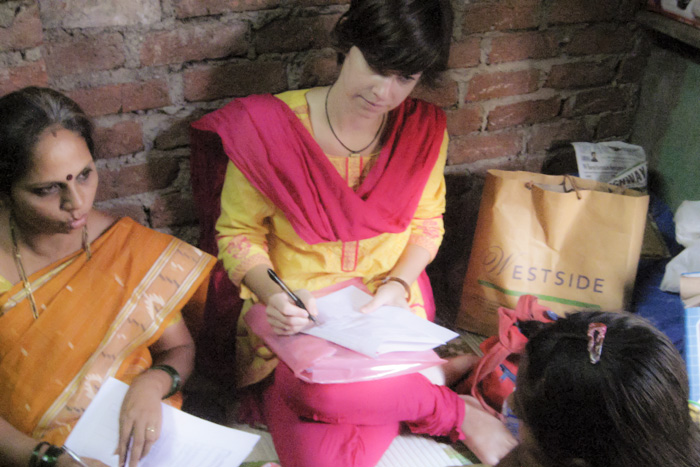
The academic year has been a remarkable one so far for UConn School of Medicine student Dylan Graetz.
In September, the fourth-year MD/MPH student was named the first recipient of the Gerard N. Burrow, M.D., Scholarship. The scholarship, created to honor retired long-time UConn Health Center trustee, director and board chair Dr. Gerard Burrow, is intended to provide support for meritorious students who demonstrate great promise. In October, Graetz presented an abstract, “Bollywood's Effect on Body-Image and Dietary Habits of Adolescent Girls in Mumbai, India,” at the American Association of Pediatrics’ annual national conference in Orlando, Fla. Her presentation was not only well-received by her audience, but named the conference’s Best Global Abstract.
The abstract that the A.A.P. honored was based on research made possible by funding provided to Graetz by the UConn School of Medicine. The funds enabled Graetz to travel to India in spring 2012 to conduct a four and one-half month study among adolescent girls in the slums of Mumbai. Graetz had spent two years designing the study with assistance from her major advisor, Stephen Schensul, director of UConn Health’s Center for International Community Health Studies. Schensul, who also conducts research in Mumbai, says such funding is vital to students’ education.
“These kinds of funds to build the opportunities for students to do really good work globally are essential now,” Schensul says. “Any good medical school is now recognizing the importance of the global experience.”

The goal of Graetz’s research was to assess the prevalence of anemia among impoverished girls and explore whether there was a connection between anemia and gender discrimination. In the process of interviewing girls, she did find, as expected, that many of them were anemic. But she also discovered something that came as a surprise: One-third of the poor, urban girls she interviewed were actually depriving themselves of food.
“I didn’t expect to find a lot of girls dieting or skipping meals in an effort to lose weight,” Graetz says. “There is literature about dieting in affluent communities, but not in slums.”
While she cannot say specifically that the girls were dieting in an attempt to look like actresses they saw on television, “Over 80 percent of the girls interviewed had a T.V. in their home and over 70 percent watched it daily, and in the qualitative interviews many of them described their ideal image of beauty as based on television,” Graetz says. “It is also true that the beauty image portrayed by Bollywood has gotten skinnier over time.
“The girls just stop eating,” Graetz says. “’Skinny jeans’ have come to the slums of Mumbai.”
Graetz found, based on World Health Organization BMI criteria, “Fifty-one percent of girls studied were underweight, 43.3 percent were within the normal range, and 5.1 percent were overweight or obese. In contrast, only 26.1 percent of girls surveyed considered themselves underweight, while 35 percent of girls thought they were average and 38 percent of girls described themselves as ‘overweight’ or ‘very overweight.’”
Graetz described her research in the presentation she went on to give at the A.A.P. conference to an audience of experienced and accomplished medical and epidemiological professionals.
Of her research in India, Graetz says, “The trip changed my life and my career. All of this reinforced my dedication to underserved communities abroad and at home.”
Because of her experience, she has made global health a priority and plans to seek out residency programs that will enable her to travel and conduct research. The Burrow Scholarship, she says, will help fund travel to interviews for residency programs with global health tracks.
“The Gerard N. Burrow, M.D., Scholarship enables us to recruit and support promising medical students like Dylan Graetz,” says Dr. Suzanne Rose, senior associate dean for education. “Strong student support is critically important for any top-tier medical school. We are grateful to the many donors who gave generously to establish this scholarship in Dr. Burrow’s honor. Their extraordinary support directly affects the quality of UConn’s medical class.”
“This scholarship has validated my work and encouraged me to think about future projects and a return trip to India,” Graetz says. She also believes that her overseas experience will make her a better doctor.
“Physicians are trusted with people’s stories,” Graetz says, “and some of the stories I learned in India are the most personal and vulnerable I have ever heard.”
Follow the UConn Health Center on Facebook, Twitter and YouTube.



